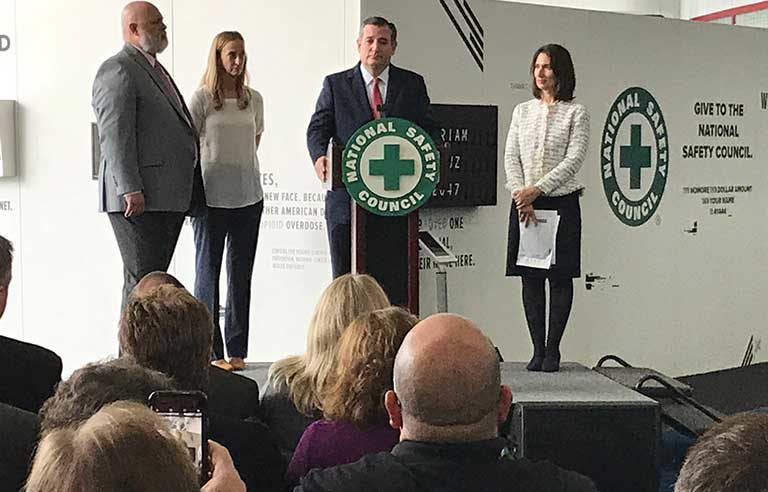Sen. Ted Cruz visits NSC opioid memorial, says crisis ‘cuts across every profession’

Houston — Sen. Ted Cruz (R-TX) paused to reflect Monday as he toured the National Safety Council Prescribed to Death memorial during the 2018 NSC Congress & Expo.
Cruz’s half-sister, Miriam, died from an opioid-related overdose in 2011. Her name can be found on the memorial wall.
During his speech, Cruz acknowledged the thousands of families that have gone through similar losses – with others, unfortunately, yet to come.
“My story is hardly unique,” said Cruz, who also lauded NSC for its ongoing effort to raise awareness of the opioid crisis with its nationwide tour of the memorial. “Every community in America faces these issues, and we need to be doing much more to prevent them.”
According to an NSC survey, 7 in 10 employers are directly affected by employees’ misuse of prescription drugs. In 2016, 1,375 Texans died from an opioid-related overdose, an NSC analysis shows.
Before an event that introduced the mural to Congress & Expo attendees – and included remarks from NSC President and CEO Deborah A.P. Hersman – Cruz spoke with Safety+Health magazine for an exclusive interview. The following is an edited transcript:
Safety+Health: You have a personal experience with the opioid epidemic. How much does that drive what you want to communicate and accomplish?
Sen. Ted Cruz: It’s a big part. The opioid crisis is destroying lives all across the country; 60,000 people died from drug overdoses last year. That’s more than died in car crashes. And it touches people from every state. It touches virtually every family in one way or another, and it underscores the need for a far more aggressive approach than what we have had, whether that is securing the borders … or whether it is reforming the delivery of health care so that addictive opioids are not the first option for pain management.
So many people start down the road to addiction through an accident or an injury where they’re prescribed opioids and get hooked. And there is a role for opioids in pain management, but there are alternatives that aren’t addictive that should be pursued first. And I do think one of the areas we’ve made real progress in recent years is for the medical profession to focus on the downsides and risks. We need to do much more of that.
S+H: Statistics show that the opioid crisis impacts a majority of employers. Which other areas of focus have you seen for workplaces?
Cruz: Unquestionably. I mean, this is an epidemic that cuts across every profession. It cuts across every racial and ethnic line. It cuts across genders, cuts across every socioeconomic level. And those dealing with addiction need to be in treatment, and if they don’t get in treatment, it can get out of control and it can take their life.
S+H: You have been supportive of the extensive legislation to combat the opioid crisis. What is your view on the impact it can make?
Cruz: Well, I’m glad that Congress has passed landmark opioid legislation. I was an active supporter of that legislation. I think there are many positive elements in terms of martialing law enforcement resources, martialing treatment resources, combating those who are abusing the system. I suspect it’s not going to be the last legislation that’s needed, but I hope it is a significant step forward in helping defeat this epidemic.

